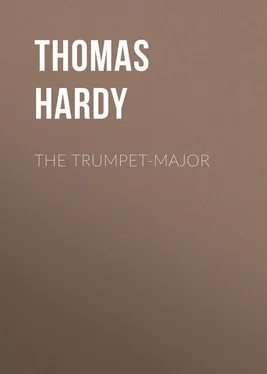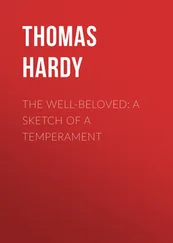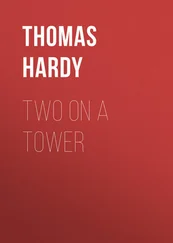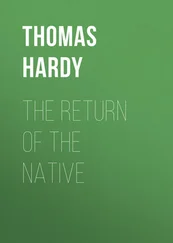Thomas Hardy - The Trumpet-Major
Здесь есть возможность читать онлайн «Thomas Hardy - The Trumpet-Major» — ознакомительный отрывок электронной книги совершенно бесплатно, а после прочтения отрывка купить полную версию. В некоторых случаях можно слушать аудио, скачать через торрент в формате fb2 и присутствует краткое содержание. Жанр: foreign_antique, foreign_prose, на английском языке. Описание произведения, (предисловие) а так же отзывы посетителей доступны на портале библиотеки ЛибКат.
- Название:The Trumpet-Major
- Автор:
- Жанр:
- Год:неизвестен
- ISBN:нет данных
- Рейтинг книги:5 / 5. Голосов: 1
-
Избранное:Добавить в избранное
- Отзывы:
-
Ваша оценка:
- 100
- 1
- 2
- 3
- 4
- 5
The Trumpet-Major: краткое содержание, описание и аннотация
Предлагаем к чтению аннотацию, описание, краткое содержание или предисловие (зависит от того, что написал сам автор книги «The Trumpet-Major»). Если вы не нашли необходимую информацию о книге — напишите в комментариях, мы постараемся отыскать её.
The Trumpet-Major — читать онлайн ознакомительный отрывок
Ниже представлен текст книги, разбитый по страницам. Система сохранения места последней прочитанной страницы, позволяет с удобством читать онлайн бесплатно книгу «The Trumpet-Major», без необходимости каждый раз заново искать на чём Вы остановились. Поставьте закладку, и сможете в любой момент перейти на страницу, на которой закончили чтение.
Интервал:
Закладка:
‘Do you think we ought to go, mother?’ said Anne slowly, and looking at the smaller features of the window-flowers.
‘Why not?’ said Mrs. Garland.
‘He will only have men there except ourselves, will he? And shall we be right to go alone among ’em?’
Anne had not recovered from the ardent gaze of the gallant York Hussars, whose voices reached her even now in converse with Loveday.
‘La, Anne, how proud you are!’ said Widow Garland. ‘Why, isn’t he our nearest neighbour and our landlord? and don’t he always fetch our faggots from the wood, and keep us in vegetables for next to nothing?’
‘That’s true,’ said Anne.
‘Well, we can’t be distant with the man. And if the enemy land next autumn, as everybody says they will, we shall have quite to depend upon the miller’s waggon and horses. He’s our only friend.’
‘Yes, so he is,’ said Anne. ‘And you had better go, mother; and I’ll stay at home. They will be all men; and I don’t like going.’
Mrs. Garland reflected. ‘Well, if you don’t want to go, I don’t,’ she said. ‘Perhaps, as you are growing up, it would be better to stay at home this time. Your father was a professional man, certainly.’ Having spoken as a mother, she sighed as a woman.
‘Why do you sigh, mother?’
‘You are so prim and stiff about everything.’
‘Very well – we’ll go.’
‘O no – I am not sure that we ought. I did not promise, and there will be no trouble in keeping away.’
Anne apparently did not feel certain of her own opinion, and, instead of supporting or contradicting, looked thoughtfully down, and abstractedly brought her hands together on her bosom, till her fingers met tip to tip.
As the day advanced the young woman and her mother became aware that great preparations were in progress in the miller’s wing of the house. The partitioning between the Lovedays and the Garlands was not very thorough, consisting in many cases of a simple screwing up of the doors in the dividing walls; and thus when the mill began any new performances they proclaimed themselves at once in the more private dwelling. The smell of Miller Loveday’s pipe came down Mrs. Garland’s chimney of an evening with the greatest regularity. Every time that he poked his fire they knew from the vehemence or deliberateness of the blows the precise state of his mind; and when he wound his clock on Sunday nights the whirr of that monitor reminded the widow to wind hers. This transit of noises was most perfect where Loveday’s lobby adjoined Mrs. Garland’s pantry; and Anne, who was occupied for some time in the latter apartment, enjoyed the privilege of hearing the visitors arrive and of catching stray sounds and words without the connecting phrases that made them entertaining, to judge from the laughter they evoked. The arrivals passed through the house and went into the garden, where they had tea in a large summer-house, an occasional blink of bright colour, through the foliage, being all that was visible of the assembly from Mrs. Garland’s windows. When it grew dusk they all could be heard coming indoors to finish the evening in the parlour.
Then there was an intensified continuation of the above-mentioned signs of enjoyment, talkings and haw-haws, runnings upstairs and runnings down, a slamming of doors and a clinking of cups and glasses; till the proudest adjoining tenant without friends on his own side of the partition might have been tempted to wish for entrance to that merry dwelling, if only to know the cause of these fluctuations of hilarity, and to see if the guests were really so numerous, and the observations so very amusing as they seemed.
The stagnation of life on the Garland side of the party-wall began to have a very gloomy effect by the contrast. When, about half-past nine o’clock, one of these tantalizing bursts of gaiety had resounded for a longer time than usual, Anne said, ‘I believe, mother, that you are wishing you had gone.’
‘I own to feeling that it would have been very cheerful if we had joined in,’ said Mrs. Garland, in a hankering tone. ‘I was rather too nice in listening to you and not going. The parson never calls upon us except in his spiritual capacity. Old Derriman is hardly genteel; and there’s nobody left to speak to. Lonely people must accept what company they can get.’
‘Or do without it altogether.’
‘That’s not natural, Anne; and I am surprised to hear a young woman like you say such a thing. Nature will not be stifled in that way..’ (Song and powerful chorus heard through partition.) ‘I declare the room on the other side of the wall seems quite a paradise compared with this.’
‘Mother, you are quite a girl,’ said Anne in slightly superior accents. ‘Go in and join them by all means.’
‘O no – not now,’ said her mother, resignedly shaking her head. ‘It is too late now. We ought to have taken advantage of the invitation. They would look hard at me as a poor mortal who had no real business there, and the miller would say, with his broad smile, “Ah, you be obliged to come round.”’
While the sociable and unaspiring Mrs. Garland continued thus to pass the evening in two places, her body in her own house and her mind in the miller’s, somebody knocked at the door, and directly after the elder Loveday himself was admitted to the room. He was dressed in a suit between grand and gay, which he used for such occasions as the present, and his blue coat, yellow and red waistcoat with the three lower buttons unfastened, steel-buckled shoes and speckled stockings, became him very well in Mrs. Martha Garland’s eyes.
‘Your servant, ma’am,’ said the miller, adopting as a matter of propriety the raised standard of politeness required by his higher costume. ‘Now, begging your pardon, I can’t hae this. ’Tis unnatural that you two ladies should be biding here and we under the same roof making merry without ye. Your husband, poor man – lovely picters that a’ would make to be sure – would have been in with us long ago if he had been in your place. I can take no nay from ye, upon my honour. You and maidy Anne must come in, if it be only for half-an-hour. John and his friends have got passes till twelve o’clock to-night, and, saving a few of our own village folk, the lowest visitor present is a very genteel German corporal. If you should hae any misgivings on the score of respectability, ma’am, we’ll pack off the underbred ones into the back kitchen.’
Widow Garland and Anne looked yes at each other after this appeal.
‘We’ll follow you in a few minutes,’ said the elder, smiling; and she rose with Anne to go upstairs.
‘No, I’ll wait for ye,’ said the miller doggedly; ‘or perhaps you’ll alter your mind again.’
While the mother and daughter were upstairs dressing, and saying laughingly to each other, ‘Well, we must go now,’ as if they hadn’t wished to go all the evening, other steps were heard in the passage; and the miller cried from below, ‘Your pardon, Mrs. Garland; but my son John has come to help fetch ye. Shall I ask him in till ye be ready?’
‘Certainly; I shall be down in a minute,’ screamed Anne’s mother in a slanting voice towards the staircase.
When she descended, the outline of the trumpet-major appeared half-way down the passage. ‘This is John,’ said the miller simply. ‘John, you can mind Mrs. Martha Garland very well?’
‘Very well, indeed,’ said the dragoon, coming in a little further. ‘I should have called to see her last time, but I was only home a week. How is your little girl, ma’am?’
Mrs. Garland said Anne was quite well. ‘She is grown-up now. She will be down in a moment.’
There was a slight noise of military heels without the door, at which the trumpet-major went and put his head outside, and said, ‘All right – coming in a minute,’ when voices in the darkness replied, ‘No hurry.’
Читать дальшеИнтервал:
Закладка:
Похожие книги на «The Trumpet-Major»
Представляем Вашему вниманию похожие книги на «The Trumpet-Major» списком для выбора. Мы отобрали схожую по названию и смыслу литературу в надежде предоставить читателям больше вариантов отыскать новые, интересные, ещё непрочитанные произведения.
Обсуждение, отзывы о книге «The Trumpet-Major» и просто собственные мнения читателей. Оставьте ваши комментарии, напишите, что Вы думаете о произведении, его смысле или главных героях. Укажите что конкретно понравилось, а что нет, и почему Вы так считаете.












